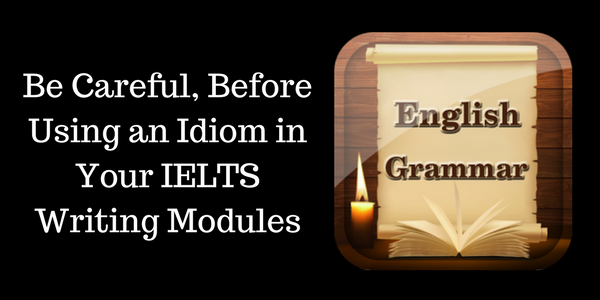Be Careful, Before Using an Idiom in Your IELTS Writing Module
An idiom is a phrase with a pictorial significance that doesn’t accord with the actual meaning. In simple terms, an association of words connected by usage as having a meaning not deducible from those individual words.
Some writers make the best use of idioms to add colors, and a touch of flamboyance to their piece of writing, while others are adamant about their work to keep it as simple as possible for their readers. Though idioms can certainly clutter your article, blog, or document with unnecessary details, they may also introduce powerful imagery to your text, and this can magnetize the readers.
Now, coming to your IELTS written module- be careful, before using an Idiom in your IELTS, otherwise in the course of making your content more attractive you may end up losing some crucial marks.
Know the Meaning
It is given that before adding an idiom, you should be through with its exact meaning, and not just its usage. What’s more select the ones that seamlessly blend with the given context. For instance, informal idioms those, which are shouted in our daily-life make no sense in an academic writing task. Another facet to look in is the theme of the IELTS written text assignment.
Take into Account Your Audience- IELTS Examiner
It goes without saying, idioms are often confusing and never impress middle-aged readers Idioms such as “one over the eight,” gone pear-shaped,” and “up sticks” may force the examiner to reach out dictionary or surf internet to find their meaning, and this curtails your marks in the written module.
Don’t Get Personal
No matter how empathetic and attractive they may sound, it is not ethical to use idioms to describe or criticize anyone, company, or an organization in your IELTS task.
Stay Away From Clinches
When an expression is being overused or common, people gloss over it, and the same goes for IELTS written test. Idioms like “hit the nail on the head,” look a gift horse in the mouth,” and “don’t count your chickens before they hatch,” are so similar nowadays they no longer mean anything and act as clinches
At last, most of the tips listed on the internet related to grammar syntax are no value, unless you through with your grammar, which comes after you join IELTS coaching classes of British IELTS.




